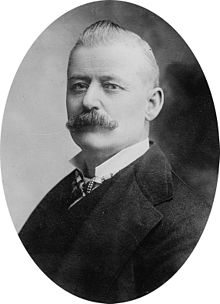George W. Plunkitt | |
|---|---|
 | |
| Member of the New York Senate from the 17th district | |
| In office January 1, 1899 – December 31, 1904 | |
| Preceded by | Charles B. Page |
| Succeeded by | Martin Saxe |
| Member of the New York Senate from the 11th district | |
| In office January 1, 1892 – December 31, 1893 | |
| Preceded by | Eugene S. Ives |
| Succeeded by | Joseph C. Wolff |
| In office January 1, 1884 – December 31, 1887 | |
| Preceded by | Frank P. Treanor |
| Succeeded by | Eugene S. Ives |
| Member of the New York State Assembly from the 17th district | |
| In office January 1, 1869 – December 31, 1870 | |
| Preceded by | Frederick H. Flagge |
| Succeeded by | Edmond Connelly |
| Personal details | |
| Born | George Washington Plunkitt November 17, 1842 Manhattan, New York City, United States |
| Died | November 19, 1924 (aged 82) Manhattan, New York City, United States |
| Political party | Democratic |
| Spouse | Mary |
| Children | George Edward Plunkitt |
| Parents |
|
| Relatives | Brothers: Daniel Plunkitt (his twin), James Plunkitt, Harry Plunkitt, Martin Plunkitt Sister: Phebe Plunkitt |
| Profession | Politician |
George Washington Plunkitt (November 17, 1842 – November 19, 1924) was an American politician from New York State, who served in both houses of the New York State Legislature. He was a leader of the Tammany Hall political organization, a vehement critic of the Civil Service, and notably responsible for a series of colloquial and practical short talks recorded in "Plunkitt of Tammany Hall," which comprise his observations and successful mastery of machine politics.[1]
- ^ Plunkit of Tammany Hall. Penguin Group. 1995. pp. 97–. ISBN 978-0-451-47413-1.